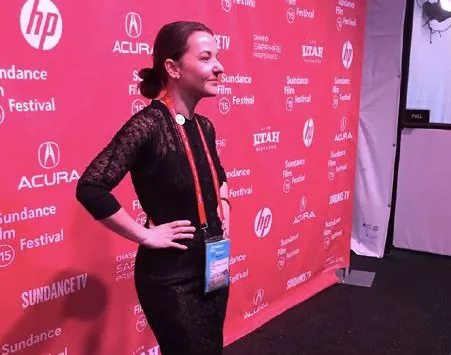Major:
Journalism
Year Graduated:
2002
Hometown:
Kimper, KY
Current City:
Los Angeles, CA
Current Employer:
Filmmaker; Lecturer in the School of Cinematic Arts at the University of Southern California
Top played song on your playlist?:
"Over My Head" by Alabama Shakes
Where has your CI degree taken you?:
Three months after I graduated from UK, I moved to Los Angeles to pursue an MFA from the University of Southern California's School of Cinematic Arts where I studied interactive media and documentary storytelling. I currently teach in the Division of Media Arts + Practice, which is devoted to exploring the potentials of storytelling, media design, scholarly expression, and emergent digital technologies. My classes are a unique extension of my documentary filmmaking practice and my students learn how to develop and produce documentary projects, remix videos, in addition to transmedia and other cross platform storytelling projects. I aim to create learning experiences that are based in creative practice, research, critical inquiry, and innovation.
I am committed to a feminist approach and interested in documentaries, socially conscious media, and emerging modes of storytelling. I have worked on Academy Award® nominated and Emmy Award winning teams and as a producer on projects that have premiered at the Sundance, Berlin, and SXSW film festivals as well as on Netflix, Oprah Winfrey’s Network, A&E, HBO, Discovery International, and the Sundance Channel.
I co-directed and produced the Netflix Original documentary Tig, about cancer survivor and comedian Tig Notaro. Tig was an Official Selection of the 2015 Sundance Film Festival where I was one of nine women debuting a feature film. Tig was also an Official Selection of the Seattle International Film Festival, Hot Docs Canadian International Film Festival, Outfest, and International Documentary Film Festival in Amsterdam.
I am currently developing a mix of fiction, non-fiction, and hybrid projects. I am making So Help You God, a cross-platform documentary project about six people (including three women) from my hometown in eastern Kentucky who are serving life in prison. I'm also developing a feature length documentary that examines a cultural history of the American hillbilly icon. I’m thinking about content that highlights the culture and traditions of Appalachia and Appalachian American people as well as content that is focused on advancing reform on a range of issues facing the U.S. criminal justice system.
What is your favorite thing about your job?:
I have been fortunate to work on a wide range of projects over the years - from feature length documentaries to series and digital activist projects. My work seeks to build on the long history of non-fiction work that addresses significant social challenges of our time, focusing in on the Appalachian region and the experiences of women and girls and the queer community.
Interviewing is my favorite task of the filmmaking process. It is an art form unto itself and a great honor and privilege to connect with subjects on such an intimate level. To me, cinema, movies, journalism, and media art is grounded in the emotional and ideological and it's about listening to the needs of the story and its subject (or subjects) and letting those voices guide the direction and production of the storytelling. I appreciate that my work allows me to continually expand my thinking about the role and responsibility of mediamakers in society.
What¹s the most valuable thing you learned in CI?:
As a student at UK I studied journalism. Since I began writing, I have been intrigued by stories about marginalized and vulnerable people and communities and motivated by a desire to give voice to people who have been underserved, unheard, or misrepresented.
As a student I had the benefit of working across multiple platforms, which enabled me to develop a rich and varied approach to storytelling. I was the editor in chief of the Kentucky Kernel where I won a variety of awards from the Kentucky Press Association and Kentucky Intercollegiate Press Association for my news reporting and editorial work. I also worked as a video editor at the ABC affiliate, WTVQ; wrote feature stories for the Lane Report magazine; hosted a talk show for WRFL-FM; worked as an intern at the Lexington Herald-Leader; and wrote stories for the NPR affiliate, WUKY.
Working in all of these spaces gave me the opportunity to collaborate with so many people who challenged me as a writer and content creator and inspired me to explore the richly fertile ground between cinema and journalism and the intersections between visual storytelling and newsgathering. Chris Poore, Patsy Martin, Scoobie Ryan, and Buck Ryan are among the folks who helped me find my voice as a young journalist. I was transformed by the teachings of the late Aimé J. Ellis, a former English professor and author of If We Must Die, who taught me the meaning of social consciousness and introduced me to the writings of the great bell hooks who introduced me to feminist consciousness and motivated me to think deeply and critically about the social, cultural and political impact of media representations.
What advice would you give to current CI students?:
Be kind. Surround yourself with a team of capable and kind folks to help you make your work as gracefully as possible. Know that people can only work the way they know how to work. Say yes. Don't be afraid to say no. Remember that it's a delicate balance of holding on and letting go. Trust your instincts. Be patient yet persistent. Be expansive in your thinking. Remain open to the unimaginable. Remember that your heart will stop beating someday. Have confidence in yourself. Know your intention. Make media that matters.
